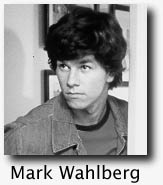<><><5><><>
"I didn't use a stand-in. But it's a trick."
--Actor Mark Wahlberg (Marky Mark) on the scene in the film Boogie Nights where he displays his large penis, to the Associated Press, Oct. 30.
<><><6><><>
"Vulgar commercialism. All you have to do is look around you, it's all about things, lots of things. That's where I think the pinpointed the spiritual anemia. ... I do think this country is grotesquely materialistic. I'm not opposed to good things -- I'm sitting here in jeans and a nice shirt. But there's a point at which it's grotesque when people just keep getting more and more things. To what purpose?"
--Lesbian author Rita Mae Brown to North Carolina's The Front Page, Oct. 24.
<><><7><><>
"We listen to our HIV positive friends talk about how their lives gradually came together after their diagnosis. We watch as those on disability spend hours a day working out and pumping up until they look healthier than the uninfected ever did. Our community offers them people to clean their homes, listen to their problems, deal with their anger and pain, do their shopping, get their medication, help them fill out their forms, distract them when they're depressed, network with other people facing the same challenges, and to get on with their day to day lives. We see them meeting other positive men, negotiating consensual unsafe sex and leading a carefree lifestyle most of us haven't tasted since the early eighties."
--Columnist Brad Fraser in the Canadian national magazine Fab, winter 1997 issue.
<><><8><><>
"Those who are HIV positive are given all the energy and resources our community has at its disposal. Those who are not HIV positive are given condoms and pamphlets."
--Columnist Brad Fraser in the Canadian national magazine Fab, winter 1997 issue.
<><><9><><>
"According to the General Accounting Office, the cost of discharging gay service members from 1980-1995 was $606,346,192, not adjusted for inflation. If we had changed the rules in 1980, we could have built new barracks, bought more jets, upgraded our communications equipment and outfitted our Marines with top- quality packs, helmets, sleeping bags and boots."
--From a Nov. 10 commentary in the Navy Times by Buster Pittman, a "pseudonym for a captain in the ground community with 10 years in the Marine Corps."
<><><10><><>
"Because of insufficient federal funds, activists were forced to turn the disease [AIDS] into a commodity and sell it to the public like any snack food, compensating for the lack of government support with private support, with charitable contributions, which they extorted from the public by arousing pity for the victims, by packaging the epidemic in sentimental cliches that reduced potential donors to a state of maximum susceptibility."
--Daniel Harris, author of The Rise and Fall of Gay Culture, in an interview taped by Visual AIDS for World Without Art Day, Dec. 1.
<><><11><><>
"My first objection to the Quilt is simply this: placing the epidemic within the context of this mythically pure colonial history is part of the way we sanitize the victims of AIDS, enshrining them within this cluttered museum of tacky folklore so resonant with wholesome patriotic feelings and nostalgia for a simpler agrarian America. This whole process of purification implies that AIDS victims are indeed truly guilty of something, namely, for having sex, and need to be sanitized, need to be cleansed in a warm bath of colonialist kitsch. Few of your readers, I hope, are going to buy this. In short, there is a very thin line between the Quilt and guilt."
--Daniel Harris, author of The Rise and Fall of Gay Culture, in an interview taped by Visual AIDS for World Without Art Day, Dec.1.
<><><12><><>
"I look at 'Ellen' and I see the sitcoms of the mid to late '70s that were just 'The Dick Van Dyke Show' in blackface. That's supposed to be progressive television? I'm not sure what the point of any of this is, except to say, 'We're just like everyone else,' when in fact we're _not_. We're _different_ ... but on 'Ellen,' it's Dick Van Dyke in lesbian-face, and I'm not sure how much longer I can stomach it."
--Sean Martin, author of the "Doc and Raider" gay comics, in an e-mail interview with this column.
<><><13><><>
"The Ellen DeGeneres coming-out campaign reminded me of the 'Classic Coke' campaign. That is, it left me wondering: was there some major Madison Avenue mindfuck going on? Some elaborate hoax to win HetAmerica's hearts through reverse psychology? That is, saturate 'em with Ellenmania, until phobic America becomes so desensitized that they finally say, 'Oh, what's the big deal?' .. Now, the soap opera continues into its next season. ... Frankly, everytime Ellen dukes it out in public against the censors, I feel this is a strategy mapped out in the ABC backrooms -- a micro-managed publicity stunt. So, good for Ellen. Good for all of us. The equation still stands: one out-and-out TV dyke has more effect on social progress than a score of gay-rights bills pending on Capitol Hill."
--Jay Blotcher, director of media relations for the American Foundation for AIDS Research, in an e-mail interview with this column.


